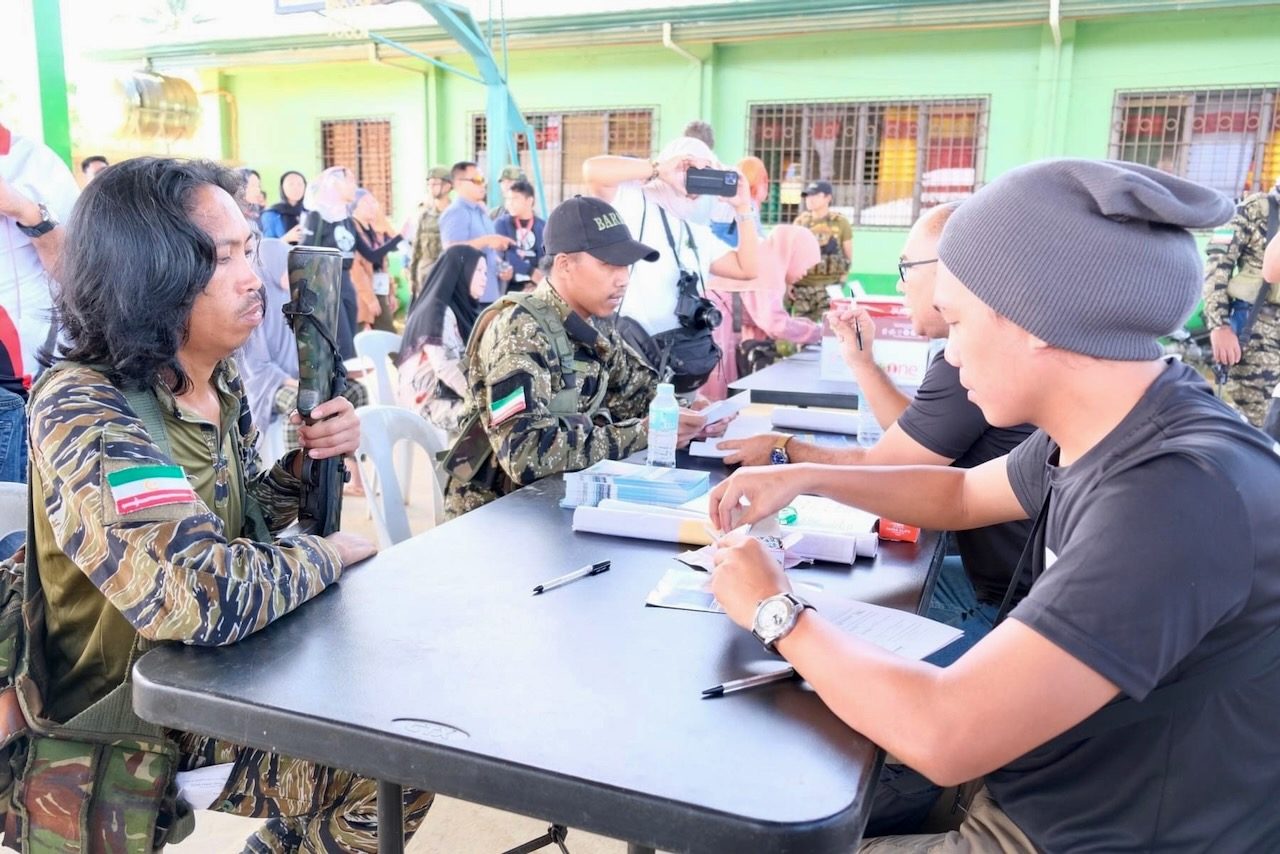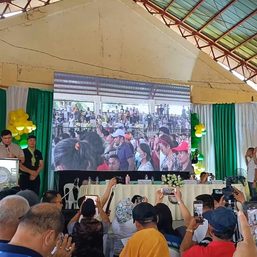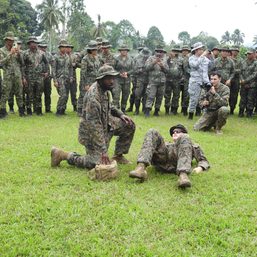SUMMARY
This is AI generated summarization, which may have errors. For context, always refer to the full article.

MANILA, Philippines – The reminder that challenges still haunt the peace process in Mindanao came amid the high emotions on April 27 as 300 combatants and non-combatants of the Moro Islamic Liberation Front (MILF) received their birth certificates in Camp Bilal, Munai, Lanao del Norte.
Bangsamoro Transition Authority Parliament Member Abdullah Macapaar, still popularly known by his nom de guerre Commander Bravo, thanked the government for giving MILF members access to legal identity documents.
Around 40,000 MILF combatants need these papers to tap into a package of government services in return handing over their weapons.
But within minutes of his talk, Macapaar raised combatants’ impatience over the decommissioning process.
Macapaar acknowledged the P100,000 cash exchange for each firearm that was turned over in the initial implementation of the Comprehensive Agreement on the Bangsamoro (CAB).
“But our question is, where is the P900,000?” he asked, to loud applause and some catcalls.
He addressed Secretary Isidro Purisima, successor of retired general and now Defense Department officer-in-charge Carlito Galvez Jr., at the Office of the Presidential Adviser for Peace, Reconciliation and Unity (OPAPRU).
“What can you do to help? The guns have piled up in the warehouse, but the government doesn’t seem to want to accept these. I don’t understand why you don’t want these,” Macapaar said in Filipino, the national language.

Festering issue
Purisima kept a straight face in front of foreign diplomats, including counter-terrorism experts.
Later, he told reporters, “We want them to understand that what we call cash assistance isn’t just about the cash component.”
He said “cash assistance” includes access to education, identity papers, health, livelihood training, and even infrastructure.
But to many combatants who are not active in BTA governance affairs, Purisima’s list of services are things expected of the government.
They see this as separate from the decommissioning commitments.
Macapaar is part of the BTA, a special accommodation: He campaigned for plebiscite approval of the law that created BARMM. But his province, Lanao del Norte, blocked the six towns that wanted to join the expanded autonomous region.
If a BTA member like Macapaar has a wrong notion of cash assistance, then the government’s peace drive has a problem.
The confusion over the decommissioning package is not new. Senators discussed this at a 2019 budget hearing for the OPAPRU.
On the sidelines of the event, Rappler interviewed 28-year-old Razak Ito Casan.
Casan, the son of another MILF commander, applied for a birth certificate.
But he rejects the idea of decommissioning. He does not understand the need for identity documents.
Asked about prospects for child his pregnant wife is carrying, Casan said it is best if his son learns about fighting for family and homeland.
“Pagod na ako sa mga pangako ng gobyerno. Mas marami pang mas matatanda kaysa sakin; sila muna ang mauna, ako ayoko mag-decomission.” (I am tired of the government’s promises. Let the others, the older ones, go ahead. I will not join the decommission.)

Sputtering process?
The International Crisis Group (ICG) report, “Southern Philippines: Making Peace Stick in the Bangsamoro,” released on Monday, May 1, described the peace process as both on track and in peril.
It praised some moves following the signing of the Comprehensive Agreement on the Bangsamoro (CAB), citing initiatives in community health during and after the COVID-19 pandemic.
But it described normalization efforts as “sputtering,” due to budget concerns and “political realities”.
The ICG said fulfilling the normalization process of the peace agreement is an urgent task.
The Bangsamoro Autonomous Region in Muslim Mindanao (BARMM) will hold its first regular parliamentary elections in 2005, marking the start of full regional autonomy.
Already, there are signs of conflict between Muslim traditional politicians and the new-to-governance senior leaders of the MILF.
There have also been clashes among clans within the MILF. And even among the MILF leadership, ethnic clashes have derailed needed aid, causing disgruntlement.
Decommissioning
The ICG stressed the need to accelerate normalization, which includes the disarmament of rebels and militia.
It stressed that disarmament should not just be limited to MILF combatants but also the known private armies of traditional political warlords.
“The clans often employ what amount to private armies: some of the violence in the region can be traced to tussles between them and the ex-rebels. Although these militias pose no threat to national security, Manila needs to get serious about dismantling them,” the ICG warned.
There are also issues over the arms target for decommissioning.
At the close of 2022, the government had decommissioned 24,844 combatants, around 62% of the total rebel force.
But the third-party Independent Decommissioning Body and the government only received 4,625 weapons – representing just over 18% of the total combatants.
Purisima on April 27 said the government intends to decommission 1,300 combatants in Phase 3.
The Phase 4 target he said, is around 14,000 – 5,000 in 2023 and 9,000 next year.
“There are lots of programs and documents intended for the combatants, that’s why this will take time,” he explained.
The MILF, which claims 40,000 combatants, listed a total of 7,200 firearms for decommissioning.
Hardly anyone believes the group has only that number of weapons.
But the government previously agreed to set aside from decommissioning borrowed firearms, creating a big loophole.
It is also a potential source of trouble as nobody is registering the guns on loan.
The military suggests a 1:1 ratio in guns and MILF combatants, which would raise the fourth phase target to 9,000 to 10,000 firearms, but it is unlikely to get that.

No time to lose
The ICG gave these recommendations:
- The ex-rebels running the regional government should, in coordination with Manila, improve law and order, strengthen conflict resolution efforts, and find a modus vivendi with political clans.
- Manila should focus on normalization, including the delivery of the promised socio-economic packages to demobilized combatants.
- Donors should help fill funding gaps.
The last thing the government wants is to give an impression of a new elite while the grassroots struggle with unfamiliar peacetime status, and simmer because they have been sidelined in receiving peace dividends, a senior NGO worker familiar with the peace process told Rappler on April 30.
Traditional politicians are using the slow pace of aid to siphon off support from the MILF, he added.
“The government should not underestimate the personal stakes for all these people,” said the NGO peace expert.
The Bangsamoro Organic Law (BOL) was ratified on January 25, 2019, creating the Bangsamoro Autonomous Region in Muslim Mindanao (BARMM).
In its first year, the BTA was tied to the year’s budget of its smaller predecessor, the Autonomous Region in Muslim Mindanao
In its second year, the COVID-19 pandemic swept the country, interrupting the hiring process and implementation of projects.
As normalization limped along, decommissioning targets languished.
But not all of the delays can be blamed on COVID-19.
The ICG said the parliament passed only three of the seven “priority codes” that need to replace former laws governing elections, regional government, education, the civil service, and other local matters.
The MILF leaders now overseeing BARMM acknowledge the need to improve absorptive capacity for funding opportunities.
In 2020, BARMM had barely touched half of its P63 billion block grant.
Its parliament passed a P85.3-billion 2023 budget for the special administrative region.
Faultlines
Like Casan, other combatants could balk at decommissioning unless normalization programs transform life in their former guerrilla camps.
“Some former MILF fighters have not received the socio-economic assistance packages the government pledged to give them,” the report pointed out.
“Much of the Bangsamoro is economically depressed, and the MILF camps need significant support in order to develop” into peaceful communities integrated into economic and civic life, said ICG.

Macapaar also hinted at ethnic fault lines within BARMM.
“I am the one only recognized in BARMM,” he said. “Nobody here is.”
“When I go to the national government, they tell me to go to BARMM. When I go to BARMM, they say we are not part of it,” he explained.
“I tell the government, we are not just fighters for the Muslims. We fight also for the government,” Macapaar said. “Unless we are not wanted.” – Rappler.com
Add a comment
How does this make you feel?





There are no comments yet. Add your comment to start the conversation.